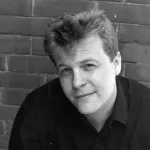Our mother gave us a sack of weed killer
the size of a toddler, and told us
to spread it on the front lawn.
My sister and I lugged it there.
A light cloud of white powder
drifted up to our nostrils
and down to our tongues, blooming sour
wherever it touched membrane.
We scooped the stuff out with teenaged zeal
as we dusted the lawn, checkerboard lines
mounded where the grass was thin.
We thought we were done,
but there was still half a sack left.
So we poured again,
more diligently, layering it thick
as it caked in our nails and our palms.
The lines dispersed into snowdrift
wafted by the breeze to our clothes and hair
to neighbourhood gardens, cars, open windows,
to people chatting or eating,
to birds, beyond birds.
We were proud farmers
over a crop we’d just saved.
Then our mother returned
to tell us we’d done it all wrong.
The soft sourness lingered for days
as we watched the lawn choke,
its yellowing skin shrivelling
into bald, numbed soil
that took years to recover.
That fine bitter powder bestowed by our mother,
scattered like ashes over our lives
to steep in blood and bind with tears
in the slow dark turn
of flesh and earth against breath.
Fiona Tinwei Lam moves from personal to universal and back to the personal in this chilling poem about the ecological destruction bequeathed from one generation to the next.
1. Who is the speaker in this poem, and who are the other characters?
2. The sack of weed killer is described as being “the size of a toddler.” What do you think the significance of this is?
3. How does the poet handle distance, and the illustration of distance in space, in this poem? For example in the lines leading up to “to birds, beyond birds.” How does the poet convey distance in time?
4. What do you think the significance is in the fact that the speaker’s mother gives her the sack of weed killer? What further inheritance is suggested in the poem’s final stanza?
5. If you were reciting this poem, how would you handle the poet’s internal slant rhyme (half / sack, thick / snowdrift, etc.)? Where would you speed up and slow down in the telling of the story contained in the poem?
Writing activity:
In the spirit of this poem, choose an ecological issue or event and write a poem that bridges from the personal to the universal (and potentially back again), or a poem that creates distance the way this one does in the lines: The lines dispersed into snowdrift /
wafted by the breeze to our clothes and hair / to neighbourhood gardens, cars, open windows, / to people chatting or eating, /
to birds, beyond birds.
Useful Links
https://fionalam.net/poetry-videos/plasticpoems/
https://roommagazine.com/plasticnic-and-platicpoems-by-fiona-tinwei-lam/
Fiona Tinwei Lam, "Weed Killer". Copyright © Fiona Tinwei Lam 2009. Reprinted by permission of the publisher.
Source: Enter the Chrysanthemum (Caitlin Press, 2009)





